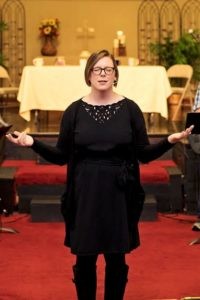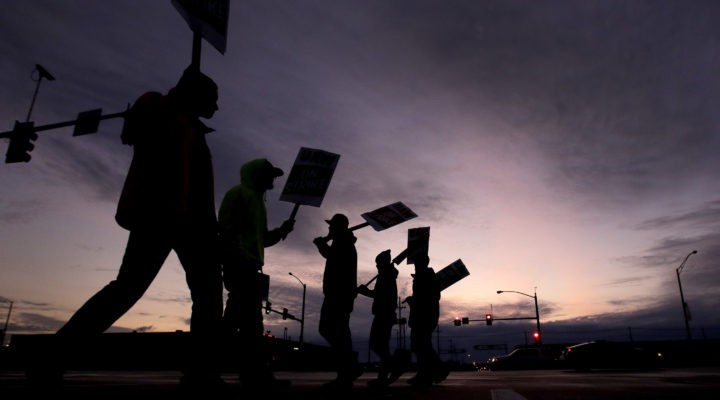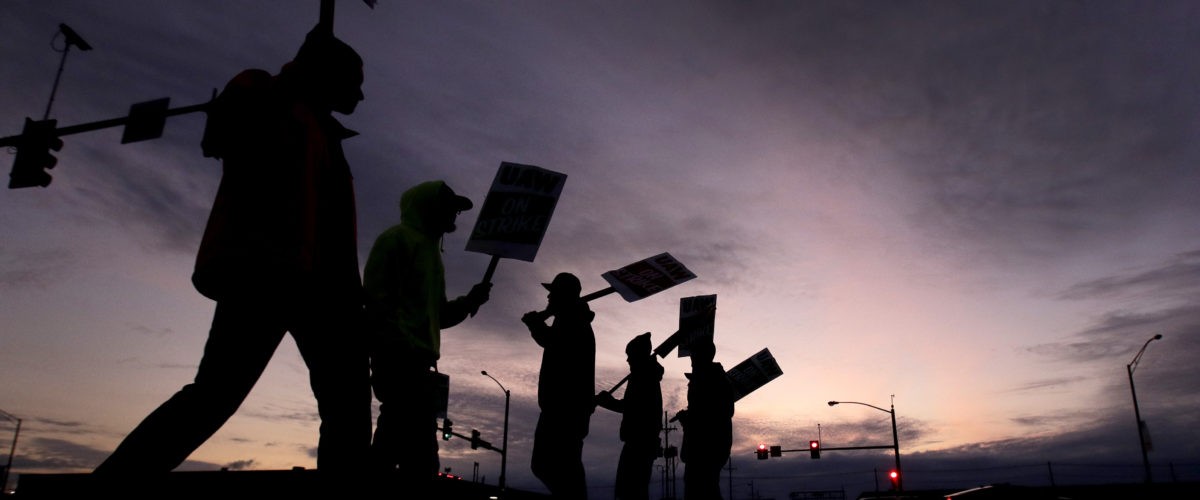The union strike against General Motors continued for just over a month before negotiators reached a tentative settlement Wednesday. But it was enough time for people of faith to provide moral and spiritual support to picketers.

Stephanie Swanson
Standing with the United Automobile Workers on Oct. 8 was Stephanie Swanson, a Baptist minister and the pastor of Crossroads Church in Kansas City, Missouri.
She was one of three clergy encouraging UAW members from GM’s Fairfax Assembly and Stamping Plant in Kansas City, Kansas. It’s one of multiple sites where the strike continues until a final settlement is reached.
“What you are asking for, what you are demanding, is not unreasonable,” Swanson said in a report by television station KSHB in Kansas City. “It is fair, it is right and it is equitable.”
It is also nothing unusual for Swanson, a Wake Forest School of Divinity graduate, to be taking public stands on social justice issues.
Equitable pay – and its life-giving impact on families – is an issue Christ would support, she told Baptist News Global.
“I really think of it as a justice issue,” she said. “In corporate America, we see people profiting off the blood and the sweat of American workers.”
Swanson has served Crossroads Church since 2015. Previously she was pastor of First Baptist Church in Smithville, Missouri, and before that served as the minister of congregational life at Emerywood Baptist Church in High Point, North Carolina.
She spoke with BNG about her experience at the picket line, and about a theology and faith which compels such actions. Her comments are presented here, edited for clarity.
“Baptist pastor locks arms with striking workers.” That’s not a line you read every day. How did you come to be involved in that effort?
My church is a part of MORE2 – an organization that works for racial and economic equity. We are also one of over 25 churches in both the Missouri and Kansas sides of Kansas City that are part of the Gamaliel Network, a national organization that is based around racial and economic equity. Within MORE2 I am the chair of the clergy caucus on the Missouri side. That’s how I came to be at this event.
How does a work stoppage meet the definition of a social justice issue for you?
I don’t know if I ever saw myself standing in a picket line at a strike. This was a first for me. I have sat in at City Hall about contracts for building projects and how they hire minorities and women. I have also marched in immigration parades and I spoke out after the Pulse shooting in Florida.
When I was asked to be present at the picket line, I had to think what it meant. I reflected on the parable of the vineyard owner. Everyone is paid the same wage, even the person who gets there late, because they need a living wage, they need to be able to care for their families. When I did the research, I learned a lot of them (GM employees) are making less today than they were making in 2008 when workers sacrificed their livelihood to bail out this corporation. And now they are suffering.
Is there broad church support for the picketers in that area?
I have heard of organizations taking food over there. I even heard they have meat coming in that’s been smoked. And church food pantries have their doors open. When I shared with my church members the next day, one of them said they were going out there in a car loaded with donuts. It was encouraging to see church members who are wanting to support them as well.
What message did you hope to communicate with your presence among the strikers?
I think it tells them they are not alone. At least that’s something I saw in peoples’ eyes and what they said to me. It grounds them somewhat because a lot of people out there are people of faith. Many are Christians but there also are other faiths. And in many faith traditions there is a call for justice. We see that with Jesus acting on behalf of the vulnerable and oppressed. Our hope was the workers would feel a sense of support, a sense that what they were seeking is fair, that it’s not uncalled for or outrageous.
Your church bio says you were seeking a diverse, ecumenical, inclusive and loving congregation. Have you found it?
Absolutely. The congregation itself is made up of people from many different denominations. I am a Baptist pastor. I was ordained Baptist. And Crossroads does partner with the Alliance of Baptists and the Association of Welcoming and Affirming Baptists. But we consider ourselves an ecumenical and unaffiliated congregation. We have a lot of people with Baptist backgrounds. That’s probably the largest. But we also have a lot of former Catholics, Methodists, Presbyterians, Pentecostals – we run the gamut.
How is that diversity expressed in the life of the church?
They bring together all of that history and all of those ways of looking at faith. In preaching and small group and worship styles we are much more ecumenical. We also have some values that are shared, and key among them is social justice – taking action around racial and economic justice. We also live that out through environmental justice. We have solar panels on our roofs. We are also very social justice minded in LGBTQ inclusion. Twenty-five percent of our congregation is LGBTQ.
What experiences instilled these values in you?
I grew up in a really small town outside of Chicago and led a fairly sheltered life. I went to William Jewel College in Liberty, Missouri, when it was Southern Baptist and American Baptist. And I was there when it was kicked out of SBC. I got to see a lot of that happening.
Then at Wake Forest Divinity almost every denomination was represented in the student body and faculty. I learned about so many faith perspectives and explored what I believed and what scripture says and what community is supposed to be about. College and divinity school shaped my theology.
Is it harder to be a female pastor in the South or in the Midwest?
Truthfully, in some ways I have found it’s harder in the Midwest. In North Carolina I didn’t struggle as much as a female pastor because I was just 20 minutes from seminary in an area flooded with CBF North Carolina churches. Also, I was an associate there, so that may been some of it. When I came out West and went into a senior pastor role, there were different challenges I faced as a female. We are in the Bible Belt with a strong conservative component here. So, there were a lot of Baptist circles where I wouldn’t be recognized as an equal. Of course, within this congregation I have no problem. KC is pretty progressive, so in a lot of circles I am accepted and affirmed in my role as a pastor.
Have you ever reconsidered your Baptist ordination?
I have never thought about leaving my Baptist roots. Coming to Crossroads, as a more ecumenical church, I know that I might be closing doors with some other churches. But I still feel very tied to my Baptist roots because of the freedom it gives me to discover my faith.


